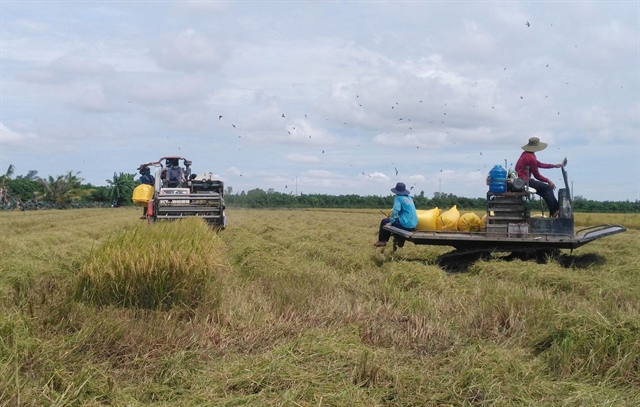 Society
Society

The Cửu Long (Mekong) Delta province of Đồng Tháp plans to develop at least one agricultural product with geographical indication by 2025.

|
| Harvesting the 2021 summer – autumn rice in Đồng Tháp Province’s Thanh Bình District. — VNA/VNS Photo Nguyễn Văn Trí |
ĐỒNG THÁP — The Cửu Long (Mekong) Delta province of Đồng Tháp plans to develop at least one agricultural product with geographical indication by 2025.
It has prioritised rice, mango, flowers and ornamental plants, citrus fruits, longan, sweet potato, lotus, taro, tra fish, red tilapia, gourami, dried snakehead fish, eel, and egg-laying ducks for this.
It will have at least five farming areas zoned for key agricultural produce like mango, citrus fruits, vegetables, gourami fish, and sweet potato.
In 2021-25 it will establish at least two more showrooms for its key agricultural products and maintain the existing two in Hà Nội and Phú Quốc Island.
It will set up a portal to trace the origins of its key agricultural products.
To promote those products both in domestic and foreign markets, it will strengthen quality inspections and support linkages between various stakeholders in producing and consuming agricultural products.
Its rice output last year was worth VNĐ15.7 trillion (US$686.8 million).
Farmers’ income from rice increased by VNĐ12.9-28.6 million ($560-1,250) per hectare per crop from 2015 as they adopted advanced farming techniques which help reduce costs.
The province has focused on developing rice – related products to add value and promote their sales through modern distribution channels.
The largest mango producer in the delta, the province reported output worth VNĐ2 trillion ($87 million) last year, a 28.2 per cent increase from five years earlier.
Its mango co-operatives and farmers have adopted advanced techniques for growing, harvesting and post-harvest preservation to improve yields and quality.
To develop agriculture rapidly and sustainably, it has solicited private investment in it and sought to restructure it in combination with implementation of the national target programme on building new-style rural areas and reducing poverty.
It has licensed 75 companies involved in processing crops, seafood and livestock.
It has focused on developing community-based tourism in farming areas such as Sa Đéc flower village, pink mandarin orchards in Lai Vung District and lotus fields in Tháp Mười District.
Huỳnh Minh Tuấn, deputy chairman of the province People’s Committee, said the aim was to develop “biological agriculture, modern rural areas and smart farmers” by 2025.
The province sought to increase agricultural production, adopt advanced techniques, foster international integration, and adapt to climate change, he said.
Linking up
Farmers in the province are harvesting the summer-autumn rice crop, and those contracted with a company can earn VNĐ3-4 million ($130-180) per hectare higher than others since they get paid VNĐ100-200 per kilogramme higher than market prices.
Co-operatives and co-operative groups represent their members and sign contracts with companies.
Ngô Phước Dũng, director of the Mỹ Đông 2 Co-operative in Tháp Mười District, said contracts were signed with two companies at the beginning of the crop.
The co-operative’s members produce rice seeds on a total area of 58.5ha.
Nguyễn Phước Thiện, director of the province Department of Agriculture and Rural Development, said to sell agricultural produce amid the pandemic, his department had taken measures to harvest, transport and organise trade promotion and create linkages between various stakeholders.
Farmers associations and other organisations had also helped sell it, he said.
Phan Thị Kim Nhung, deputy chairwoman of the province Farmers Association, said the association used to only act as a link between farmers and companies, but amid the social distancing now it also helped farmers sell their products to households and others. — VNS




